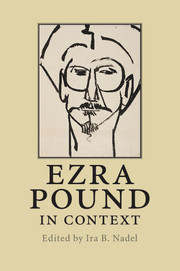Book contents
- Frontmatter
- Contents
- Notes on contributors
- Acknowledgements
- Chronology
- List of abbreviations and note on references to The Cantos
- Introduction
- Part I Biography and works
- Part II Historical and cultural context
- Part III Critical reception
- 39 Pound before Paris: 1908–1920
- 40 Pound before Pisa: 1920–1945
- 41 Pound after Pisa: 1945–1972
- 42 Influence
- Further reading
- Index
39 - Pound before Paris: 1908–1920
Published online by Cambridge University Press: 05 July 2014
- Frontmatter
- Contents
- Notes on contributors
- Acknowledgements
- Chronology
- List of abbreviations and note on references to The Cantos
- Introduction
- Part I Biography and works
- Part II Historical and cultural context
- Part III Critical reception
- 39 Pound before Paris: 1908–1920
- 40 Pound before Pisa: 1920–1945
- 41 Pound after Pisa: 1945–1972
- 42 Influence
- Further reading
- Index
Summary
Anyone needing a chronological survey of Pound's critical reception in the early years of his career should consult Eric Homberger's introduction to his Ezra Pound: The Critical Heritage. He amply covers the year-by-year comments on the early poetry, translations, and criticism. This chapter takes a different, synchronic approach. It examines the key terms that were brought to Pound's work between 1909 and 1921. Such an approach highlights the dominant critical standards of his day, some of which remain in the vocabulary of today's reviewers. Others have altered, dwindled, or faded from use. As has often been said, it was partly due to Pound's influence, and the influence of his associates, that critical discourse changed.
“ALL THINGS SAVE BEAUTY ALONE”
T. S. Eliot played a major role in that alteration. His slim volume, Ezra Pound: His Metric and Poetry (1917), was clearly the most important consideration of Pound's work to that point. It was significant because of the arguments Eliot made in Pound's favor and because of those he declined to consider. He observed at the start that his essay would “not dilate upon ‘beauties’.” The remark may be lost on those who are unaware how frequently critics of the period praised or faulted an author for the presence (or absence) of beauty in the work. We find, for example, Personae (1909) welcomed because it contained “true beauty” and was “unquestionably beautiful.” F. S. Flint similarly delighted in the “fresh beauty.” Ford Madox Ford discerned in the poems of Cathay “a supreme beauty” (EPCH, 44, 46, 108).
- Type
- Chapter
- Information
- Ezra Pound in Context , pp. 437 - 446Publisher: Cambridge University PressPrint publication year: 2010



